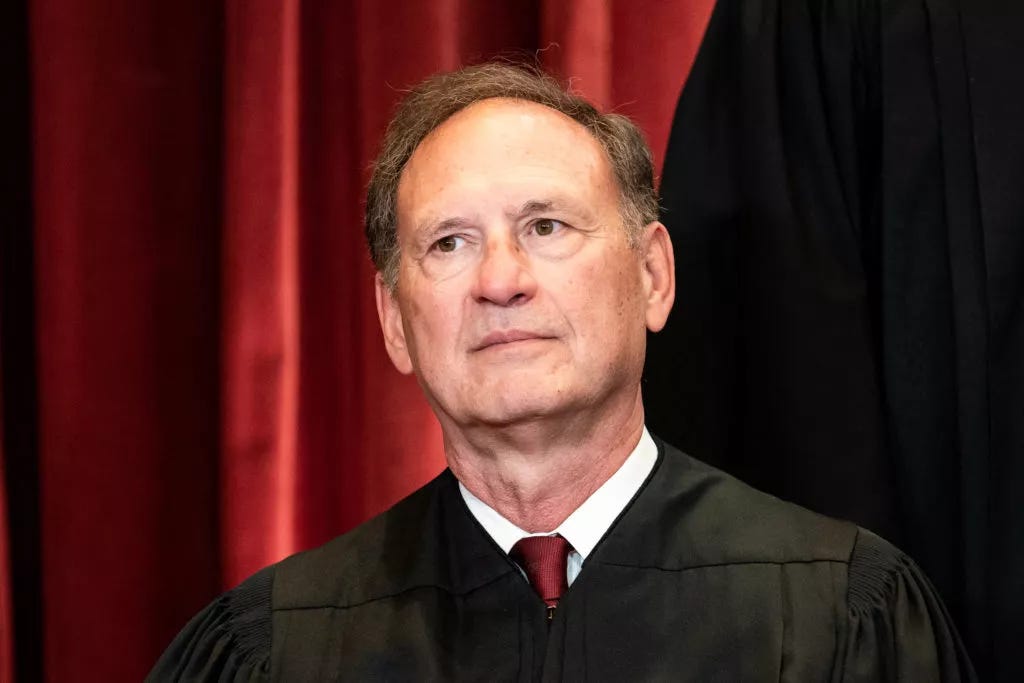Roe’s End and the Phony Doctrine of ‘Potential Life.’
Plus, the strange revelation from Sarah's latest focus groups.
Recently at The Bulwark:
CHARLIE SYKES: A Culture of Life? Don't Count on It🔐
JVL: Rules and Power and Roe🔐
CATHY YOUNG: What Comes Next?
You can support The Bulwark by subscribing to Bulwark+ or just by sharing this newsletter with someone you think would value it.
WILL SALETAN: Roe’s End and the Phony Doctrine of ‘Potential Life.’
On Friday, in its ruling overturning Roe v. Wade and Planned Parenthood v. Casey, the Supreme Court promised that other family and privacy rights weren’t in danger. In Dobbs v. Jackson Women’s Health Organization, the Court decreed that states could once again ban abortion, since (1) “the Constitution makes no reference” to that subject and (2) contrary to Roe and Casey, no right to abortion “is implicitly protected by any constitutional provision.” But Justice Samuel Alito, author of the majority opinion, insisted that this reasoning wouldn’t affect other rights not enumerated in the Constitution, such as the right to use contraception or marry a person of the same sex.
This promise is worthless, because it’s based on a principle that’s also not in the Constitution: an asserted state interest in “potential life.”
The “potential life” principle isn’t central to the Court’s reasoning in Dobbs. But politically, it plays a crucial role by limiting the decision’s impact. The justices stipulate that Dobbs doesn’t apply to other privacy or family rights because abortion is distinctive: Unlike contraception or same-sex relationships, abortion destroys unborn life. Yet they never explain how unborn life, as a state interest, can be derived from the Constitution. Instead, each time they invoke the “potential life” principle, they cite Roe or Casey.
The January 6th Committee has a surprise hearing tomorrow. We don’t know the witness(es) yet, but stay tuned for coverage. Are the January 6th hearings playing a role in Trump voters not wanting him to run in 2024?
We had planned to focus this episode on the January 6 Committee hearings. Sarah and Amanda talk about that, but something strange also happened in our last two groups: zero Trump voters wanted him to run in 2024. We talk about the hearings, how they matter for history, and whether they’re contributing to the Trump voters’ blues.
Amanda Carpenter and Will Saletan are back for Summer Monday to discuss the new post-Roe political landscape in America. They analyze the uncomfortable questions about abortion Republicans must now confront, Democratic messaging, and where we go from here.
Bulwark+ members can listen to an ad-free version of this podcast on the player of their choice. Learn more at Bulwark+ Podcast FAQ.
NICOLE PENN: The Contradictions of Jefferson’s Vision for an American University.
Reflecting on a day spent exploring Versailles and dining with French aristocrats in 1778, John Adams concluded that the people of France were simply too decadent for self-government. “The foundations of national Morality must be laid in private Families,” he noted sharply in his journal. “In vain are Schools, Accademies, and universities instituted, if Loose Principles and licentious habits are impressed upon Children in their earliest years.”
Had he read Adams’s journal, Thomas Jefferson would have begged to differ. A year after Adams jotted down his thoughts on schooling and virtue, his southern compatriot introduced legislation in the Virginia General Assembly to transform the state’s education system. In addition to establishing public elementary schools for all free children, Jefferson’s bill created grammar schools for academically advanced boys—a pool from which the highest-ranking pupils would receive a scholarship to the best university in the state.
The bill failed, but Jefferson’s belief in the power of a college education only grew stronger over time. He never lost the conviction that universities were key to forming the next generation of leaders who could protect the liberal “spirit of ’76” and the American project in republican self-government. After deeming universities like William and Mary and Hampden-Sydney College unsuited to the task, he decided to create one of his own.
🚨OVERTIME 🚨
Why you can’t maximize utility. A personal essay from Evan Armstrong on the futility of trying to maximize.
Is common sense conservatism dead in NY? John William Schiffbauer argues not yet.
Matt Labash on… Roe vs. Wade, Son Volt vs. Wilco, fly fishing vs. spin fishing.
Blimpin’ aint easy… But Sergey Brin wants to use this historic Akron, Ohio, facility to marry the past and the future.
Jim Gaffigan… On the Bert Kreischer podcast. Two hours of one of America’s favorite comedians (and mine.)
The winds of Darkstar… Behind the scenes of the recording of the new Top Gun score. (Here’s the new theme.)
Amazon’s robots of the future… How the Prime warehouses are going even more automated.
A plum assignment… Ranking the 174 pasta sauces you can buy in Cleveland.
Praying for our travelers…
That’s it for me. Tech support questions? Email members@thebulwark.com. Questions for me? Respond to this message.
—30—
Editorial photos provided by Getty Images. For full credits, please consult the article.









